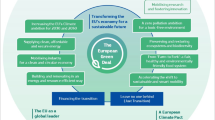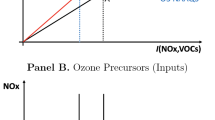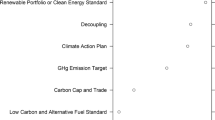Abstract
This paper studies a game between a group of countries that have agreed to participate in an international climate agreement (the signatories) and OPEC. The purpose of the signatories is to design carbon taxes that maximize their total net income, given a goal on global carbon emissions. As a response to the climate agreement, OPEC imposes an oil tax on its member states that maximizes OPEC's profits. Within a numerical model we find the subgame-perfect equilibrium of a game in which each player chooses when to fix his decision variables. It is shown that in equilibrium the group of signatories chooses to be the leader and OPEC chooses to be the follower. It is demonstrated, however, that for both agents the order of move is of minor (numerical) importance. Hence, the players have limited incentives for strategic behaviour.
Similar content being viewed by others
References
Adelman, M. A. (1993), 'Modelling World Oil Supply', Energy J. 14(1), 1–32.
Burniaux, J. P., J. P. Martin, G. Nicoletti and J. O. Martins (1991), GREEN - A Multi-Region Dynamic General Equilibrium Model for Quantifying the Costs of Curbing CO2 Emissions: A Technical Manual, OECD.
Cline, W. R. (1992), The Economics of Global Warming, Washington, D. C.: Institute for International Economics.
Dixit, A. K. (1984), 'International Trade Policy for Oliogopolistic Industries', Economic J. Suppl. 94, 1–16.
Edmonds, J. A. and Barns (1990a), 'Estimating the Marginal Cost of Reducing Global Fossil Fuel CO2 Emissions', Mimeo, Pacific Northwest Laboratory, Washington, D. C.
Edmonds, J. and D. W. Barns (1990b), 'Factors Affecting the Long-Term Cost of Global Fossil Fuel CO2 Emissions Reductions', Mimeo, Pacific Northwest Laboratory, Washington, D. C.
Gately, D. (1995), 'Strategies for OPEC's Pricing and Output Decisions', Energy J. 16(3), 1–38.
Golombek, R. and J. Bråten (1994), 'Incomplete International Climate Agreements: Optimal Carbon Taxes, Market Failures and Welfare Effects', Energy J. 15(14), 141–165.
Golombek, R., C. Hagem and M. Hoel (1995), 'Efficient Incomplete International Climate Agreements', Res. Energy Econom. 17, 25–46.
Hoel, M. (1996), 'Should a Carbon Tax be Differentiated Across Sectors?' Public Econom. 59, 17–32.
Mabro, R. (1992), 'OPEC and the Price of Oil', Energy J. 13(2), 1–17.
Nazer, H. E. M. H. (1992), Address to United Nations conference on environment and development, Rio de Janeiro, 6.10.1992.
Pearce, D. (1991), 'The Role of Carbon Taxes in Adjusting to Global Warming', Econom. J. 101, 938–948.
Perroni, C. and T. F. Rutherford, T. F. (1993), 'International Trade in Carbon Emission Fights and Basic Materials: General Equilibrium Calculations for 2020', Scandinavian J. Econom. 95(3), 257–278.
Pezzey, J. (1992), 'Analysis of Unilateral CO2 Control in the European Community and OECD', Energy J. 13(3), 159–171.
Radetzki, M. (1991), 'Price Prospects in Western Europe for Internationally Traded Fossil Fuels Until 2000', Natural Resource Forum, November 1991, 292–301.
Whalley, J. and R. Wigle (1991), 'The International Incidence of Carbon Taxes', in R. Dornbusch and J. M. Poterba, eds., Global Warming: Economic Policy Responses, Cambridge, Massachusetts: MIT Press.
Author information
Authors and Affiliations
Rights and permissions
About this article
Cite this article
Bråten, J., Golombek, R. OPEC's Response to International Climate Agreements. Environmental and Resource Economics 12, 425–442 (1998). https://doi.org/10.1023/A:1008299528789
Issue Date:
DOI: https://doi.org/10.1023/A:1008299528789




